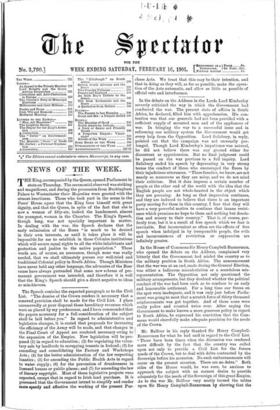Mr. Balfour in his reply thanked Sir Henry Campbell- Bannerman
for what he had said in regard to the Civil List. " There have been times when the discussion was rendered more difficult by the fact that the country was called upon not only to provide a Civil List for the future needs of the Crown, but to deal with debts contracted by the Sovereign before his accession. No such embarrassments will occur on the present occasion. There are no debts." Both sides of the House would, he was sure, be anxious to approach the subject with an earnest desire to provide adequately for the needs of the Sovereign of this great Empire. As to the war Mr. Balfour very neatly turned the tables upon Sir Henry Campbell-Bannerman by showing that the leader of the Opposition had himself asserted in his election address that the war was nearing its conclusion. As to the policy of the future, Mr. Balfour insisted that the Opposition should use clear language, and say whether they meant that Colonial self-government should be applied to the late Republics the moment the war was over. For himself he repudiated the notion, and very appositely pointed out how the North had found it im- possible immediately to restore self-government to the Southern States. On the whole, Mr. Balfour's treatment of the political position in South Africa may be pronounced as entirely sound. While absolutely firm and resolute on the essential point that the country will never withdraw from the task it has in hand in South Africa, he let it clearly be seen that when once the Boers have abandoned the present hopeless struggle, they will be treated in a wise and liberal spirit. But in reality there was never a doubt as to this in any reasonable mind. The only danger, though we hope and believe that it will be avoided, is of the Boers, after they have submitted, being unfairly petted by a too magnanimous ad- ministration, and of the loyalists who have borne the heat and burden of the day being proportionately neglected.







































 Previous page
Previous page